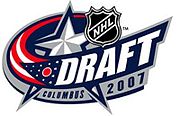 It has been five years since the 2007 NHL Entry Draft took place at the Nationwide Arena in Columbus, Ohio, hosted by the Blue Jackets. The depth of talent that was chosen in every round was quite superlative but, for some reason or another, the amount of players actually chosen who made it to the big leagues has been remarkably low. Out of the 211 players chosen, only 84 have played at least one game in the NHL, a hair under 40% of the players selected.
It has been five years since the 2007 NHL Entry Draft took place at the Nationwide Arena in Columbus, Ohio, hosted by the Blue Jackets. The depth of talent that was chosen in every round was quite superlative but, for some reason or another, the amount of players actually chosen who made it to the big leagues has been remarkably low. Out of the 211 players chosen, only 84 have played at least one game in the NHL, a hair under 40% of the players selected.
For the players who have been able to enjoy success after the 2007 NHL Entry Draft, the glory has been overwhelming. Patrick Kane has won the Calder Memorial Trophy, has played in All-Star Games, and he scored the goal that won the Stanley Cup for the Chicago Blackhawks in 2010. Alec Martinez and Dwight King got their names engraved onto the Stanley Cup in 2012. Logan Couture was a Calder nominee and he has also been named an NHL all-star. Jamie Benn was also given the opportunity to play in an All-Star Game for the first time.
This is, however, not about the players who have made it. It is about the players who, for some reason or another, have not. Out of all of the players who did not get the opportunity to appear in at least one game in the NHL, one must wonder why. Surely, they may have had the talent to make it to the next level; otherwise, they would not have been chosen. That being said, however, there have been several players chosen in the 2007 NHL Entry Draft who were befell by calamity, either a horrible injury or — in some cases — death.
It prompts the question: Was the 2007 NHL Entry Draft cursed?
*
Let us look first at some significant injuries and calamities that have stricken some players who were chosen in the 2007 NHL Entry Draft but never played in the NHL.
*
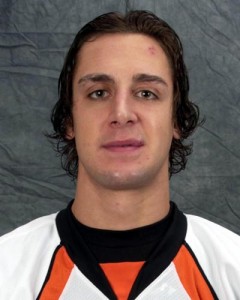
On January 23, 2009, the Philadelphia Phantoms were hosting the Manchester Monarchs in a game at the old Wachovia Spectrum. Only two seconds into the game, a fight broke out between the two enforcers, Garrett Klotz and Kevin Westgarth. Both are big men, with Westgarth being 6’4″ and 229 pounds, and Klotz at 6’5″ and 235 pounds. The fight started out innocent enough, both players connecting with solid punches. Things, however, were about to turn ugly.
The fight made its way toward the benches and Klotz, the 66th overall pick in the 2007 NHL Entry Draft to the Philadelphia Flyers, started to lose his balance. He slipped once but he regained his composure, continuing to scrap. One punch from Westgarth, however, sent Klotz backward. He hit his unprotected head on the side boards and, once he fell to the ice, he hit it again. Suddenly, Klotz started going into a violent seizure on the ice. His eyes rolled back and he had blood gushing out of his mouth. As he convulsed, Westgarth was escorted to the penalty box, visibly shaken by the events unfolding before his very eyes, his face pale with concern; Westgarth was asking players and officials if Klotz was okay. When Klotz stopped seizing, he was placed on a stretcher and he was taken to a nearby hospital where he was kept for a couple days for observation. Thankfully, Klotz made a full recovery and he was able to fight again. In fact, on February 5, 2010, he once again fought Westgarth, this time with a better outcome.
http://youtu.be/JJxkYuTK4Co
*
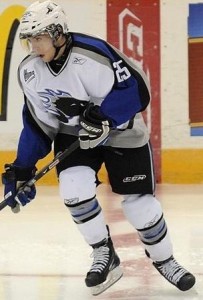
In early May of 2009, Chris DiDomenico was playing for the Drummondville Voltigeurs of the QMJHL. The Voltigeurs had acquired him in a trade from the Saint John Sea Dogs in January of that year to help them make a run for the Memorial Cup, especially since he had just helped Canada win gold at the World Juniors in Ottawa. In a playoff game against Shawinigan, he was chasing a puck alongside Cataractes defenceman Adam Bourque-Leblanc to negate a potential icing. As icing was called, Bourque-Leblanc gave DiDomenico a small shove from behind. DiDomenico fell awkwardly into the boards, his legs going first. The impact broke his femur, an injury that caused him to miss almost half a year of action.
Not only did it keep him off of the ice but it was a significant step backward in a development that was just beginning to take shape. He played in only 26 games the next season, 12 during the regular season and 14 during the playoffs. DiDomenico, who had been chosen 164th overall in the 2007 NHL Entry Draft by the Toronto Maple Leafs, was later traded to the Chicago Blackhawks; he has since been playing in the AHL with the Rockford IceHogs and the ECHL with the Toledo Walleye.
*
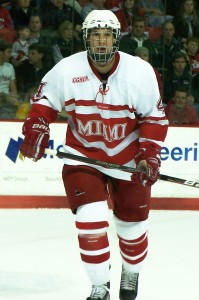
On October 23, 2010, Will Weber was playing in a game for the Miami University RedHawks against the Northern Michigan University Wildcats. The defenceman, who was chosen 53rd overall in the 2007 NHL Entry Draft by the Columbus Blue Jackets, was trying to clear the puck and, somehow, he became tangled with a player from Northern Michigan, causing both to fall. Eventually, the Wildcats player’s skate came down onto Weber’s neck, slicing the carotid artery but not deep enough to put him in worse danger.
Happily for Weber, he remained calm and conscious throughout everything, even watching the blood coming out of his neck. He was taken to hospital where he required 100 stitches and fifteen staples to close the wound, which went from his ear to his chin. Weber even made light of it on Twitter, calling it “quite a pain in the neck.” Weber returned to action not long after the injury, playing his senior year at Miami University as the RedHawks’ captain and eventually earning an entry-level contract with Columbus; he is expected to play in his first full AHL season with the Springfield Falcons in 2012-13.
*

In January 2011, Mattias Modig was starting his North American professional career. Chosen 121st overall at the 2007 NHL Entry Draft by the Anaheim Ducks, Modig, a goaltender from Luleå, Sweden, was traded to the Pittsburgh Penguins three years later, hoping that he could ascend the depth chart of their organization. Modig started his North American tenure in the ECHL with the Wheeling Nailers but it would be short-lived. Nine games into the 2010-11 season, a stretch in which he went 3-6-0, Modig suffered a horrible knee injury.
The injury was so severe that it caused Modig not only miss the remainder of the 2010-11 season but the entire 2011-12 season, as well, one in which he could have played in the AHL with Wilkes-Barre/Scranton. Modig even considered retirement. He has since recovered and, on June 14, 2012, he signed a two-year contract with the Växjö Lakers of the Elitserien.
*

In February 2012, Zack Torquato, another player on the Wheeling Nailers, was playing in a game against the Elmira Jackals. The 178th overall pick in the 2007 NHL Entry Draft by the Detroit Red Wings, Torquato, who was the second leading scorer on the Nailers and an alternate captain, had the skate of Jackals defenceman Mario Larocque come down onto his glove. While the skate blade did not go directly through Torquato’s glove, the exerted force caused for Torquato to have the middle finger on his right hand be severed from the top knuckle.
With part of his finger still on the ice, the 22-year-old Sault Ste. Marie native was taken to the hospital, much to the horror of many of the fans in attendance. Despite it all, Torquato, like Weber, remained in good spirits. He still managed to finish fifth in Nailers team scoring with 40 points (12 goals, 28 assists) in 60 games.
*
Happily, for the five players listed above, their injuries have not caused them to stop playing and doing what they love. Four players chosen in the 2007 NHL Entry Draft, however, were not so lucky.
*
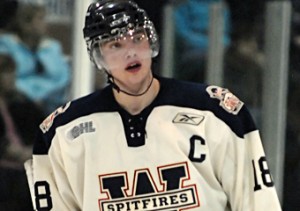
On February 18, 2008, Mickey Renaud was anticipating a skate with local children at the Windsor Arena for Ontario’s inaugural Family Day. The captain of the Windsor Spitfires, himself a native of nearby Tecumseh, was an active member in the community, something that made him appealing on and off the ice. Chosen 143rd overall in the 2007 NHL Entry Draft by the Calgary Flames, Renaud’s late birthday (October 5, 1988) meant that he was likely going to be ending his junior career not long after and joining the professional ranks. He did not realize that a game the day before, which was a 4-2 victory in Owen Sound, would actually be his last career game. On the fateful Monday, Renaud was at his family’s home when he suddenly collapsed. He was rushed to the hospital with no vital signs and, by afternoon, he had been pronounced dead. He was only 19 years old.
The Spitfires retired his #18 jersey and, in his memory, they emerged winning the Memorial Cup in each of the two subsequent seasons. Five months after his sudden death, it was revealed that Renaud suffered from hypertrophic cardiomyopathy, a rare heart condition. The OHL also named an award after the former Spitfires forward, the Mickey Renaud Captain’s Trophy.
*

Almost exactly eight months later, tragedy struck for another young hockey player. On October 13, 2008, Alexei Cherepanov was playing in a game for Avangard Omsk of the KHL alongside his idol, Jaromír Jágr, against Vityaz Chekhov. Cherepanov, who was chosen in the first round of the 2007 NHL Entry Draft, seventeenth overall, was considered the best player not in the NHL at the time. Earlier in that game, Cherepanov scored a goal but, as the game progressed, he started feeling ill. With less than three minutes in regulation, he was talking with Jágr on the bench when he suddenly collapsed. He was taken to the dressing room and he was briefly revived. By the time the ambulance came back to the arena, since it had already left, attempts at defibrillation seemed to be in vain. He was taken to the hospital and, again, he was briefly revived. Sadly, it was not meant to be. Cherepanov lapsed again into unconsciousness after the second short revival in the hospital. Two hours after his initial collapse, the young hockey star passed away. He was only 19 years old.
Cherepanov’s death cast an incredible pall over the KHL and over Russian sport. The cause of his death was disputed, whether it was hypertrophic cardiomyopathy, myocarditis or chronic ischemia. Regardless of what happened, Cherepanov is not forgotten. His #7 jersey was retired by Avangard and the KHL’s rookie of the year award was renamed in his honour. Additionally, the New York Rangers were awarded a compensatory pick in the 2009 NHL Entry Draft, 47th overall, which they used to select Ethan Werek.
*

At the 2007 NHL Entry Draft, the Nashville Predators used the 174th overall pick to select 20-year-old Kazakh-born German defenceman Robert Dietrich. A smaller, yet solid two-way defenceman, Dietrich had been a stalwart on the blueline for the DEG Metro Stars of the Deutsche Eishockeyliga, a team based out of Düsseldorf. The Predators immediately placed him in their system, signing him to a three-year entry level contract nine days before his 21st birthday. He played the first year of his contract at home in Germany, albeit playing only nine games during the 2007-08 season, before coming over to North America to play for the AHL’s Milwaukee Admirals the following season. Dietrich played 63 games in his first season, scoring 19 points (four goals, 15 assists); in his second season, he had 43 points (six goals, 37 assists) in 79 games.
Dietrich, however, never got the opportunity to play for Nashville and upon the conclusion of his entry level contract in 2010, he returned home to once again play in the DEL, this time with Adler Mannheim. In 42 games, he tallied 18 points (three goals, 15 assists). On July 5, 2011, Dietrich signed with the KHL’s Lokomotiv Yaroslavl’. Tragically, he never got the opportunity to play a single game for them. On September 7, 2011, he was killed in the plane crash that also took the lives of all of his soon-to-be teammates, the team’s coaching staff and many of the crew; he was only 25 years old.
*
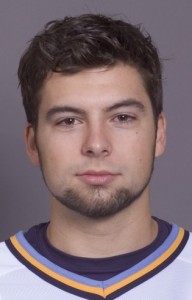
With the fourth-last pick in the 2007 NHL Entry Draft, 208th overall, the Detroit Red Wings chose Bryan Rufenach, a smaller offensive-minded defenceman from the OPJHL’s Lindsay Muskies. From the small town of Cameron, Ontario, not far from Barrie, Rufenach opted not to play for the Oshawa Generals (who made him the 181st overall pick in the 2005 OHL Priority Selection) to play for Lindsay, keeping his NCAA eligibility intact. In two years with the Muskies prior to being drafted, he scored 58 points (22 goals, 36 assists) in 79 games. Upon the conclusion of his OPJHL career, Rufenach committed to playing for Clarkson University to study finance. In four years with the Golden Knights, he scored 55 points (21 goals, 34 assists) in 136 games. His best offensive season came in 2009-10, his junior year, in which he scored 20 points (five goals, 15 assists) in 34 games. The year before, his sophomore season, he was named to the ECAC All-Academic Team.
Upon the completion of his NCAA career, Rufenach signed with the Toledo Walleye, Detroit’s ECHL affiliate. He scored his first professional goal in his second career game on March 26, 2011, against Chet Pickard of the Cincinnati Cyclones. The next season, Rufenach became one of the Walleye’s best point-scoring defencemen, his best game coming on November 9, 2011, against the Chicago Express; in that game, he scored all four of Toledo’s goals in a game that they unfortunately lost 7-4. Additionally, he was called up three times to the AHL’s Grand Rapids Griffins, tallying two assists in 13 games. Despite those promotions, Rufenach finished the ECHL season with 33 points (13 goals, 20 assists) in 54 games, finishing tied for third in Walleye team scoring. According to a profile on the Walleye team website, Rufenach’s bucket list was to travel the world and, during the 2012 offseason, he decided to take the opportunity to backpack through Europe with a childhood friend. When the pair were in Grindelwald, Switzerland, on June 5, 2012, they were mounting onto a stationary train car when Rufenach grabbed the overhead power line, which electrocuted him. Both his friend and emergency personnel tried to revive him but it was too late. Rufenach was pronounced dead at the scene. He was only 23 years old.
*
It is incredible to think that such calamity has befallen so many players chosen in the 2007 NHL Entry Draft. Of course, injuries have stricken other members of that draft class; the concussions to Max Pacioretty and David Perron come to mind immediately. Additionally, the recent “cardiac emergency” of Brett MacLean does, as well; tests are still being done to see why he collapsed so suddenly during a game of pickup hockey in Owen Sound. That being said, the fact that so much misfortune has happened to those who have, or had, not been as opportune as to have played yet in the NHL is just mind-boggling. The stupefaction of the fact that, in addition to the injuries, that four players have died in the five years since the draft makes it all the more poignant and all the more alarming.
Perhaps it is illogical to think of the 2007 NHL Entry Draft as being cursed, but as French essayist Jean de La Bruyère once said, “Logic is the technique by which we add conviction to truth.”
Coyote’s Brett Maclean was also a part of this draft. Hopefully he will be alright.
That’s very true, Megan. I hope he will be, too.
great piece
Thanks, Stephen.
Peter Chiarelli approves of this message.
Hahaha! I’m glad to hear that, Bob.